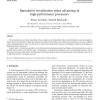Free Online Productivity Tools
i2Speak
i2Symbol
i2OCR
iTex2Img
iWeb2Print
iWeb2Shot
i2Type
iPdf2Split
iPdf2Merge
i2Bopomofo
i2Arabic
i2Style
i2Image
i2PDF
iLatex2Rtf
Sci2ools
110
Voted
JSA
2007
2007
Speculative trivialization point advancing in high-performance processors
Trivial instructions are those instructions whose output can be determined without performing the actual computation. This is due to the fact that for these instructions the output is often either one of the source operands or zero (e.g., addition with or multiplication by zero). In this work we study trivial instructions and use our findings to improve performance in high-performance processors. In particular, we introduce speculative trivialization point advancing to detect and bypass trivial instructions as soon as possible and as early as the decode stage. Consequently, we improve performance over a conventional processor (up to 30%) and a processor that detects and bypasses trivial instructions at their conventional point of trivialization (up to 5%). Ó 2007 Elsevier B.V. All rights reserved.
| Added | 16 Dec 2010 |
| Updated | 16 Dec 2010 |
| Type | Journal |
| Year | 2007 |
| Where | JSA |
| Authors | Ehsan Atoofian, Amirali Baniasadi |
Comments (0)

